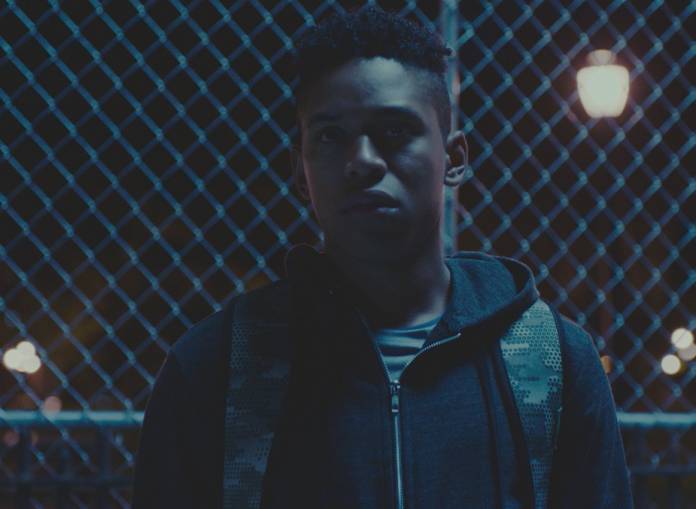It’s not exactly a secret that US conservative leaders and media have sought means of re-directing attention away from a White House that seems to log an entire Presidency’s worth of scandal every week. One of the most successful tactics has been re-branding athletes’ protest-kneeling during the pre-game national anthem as an “assault on patriotism.” That not only provides a source of distracting popular outrage, but also conveniently buries the unpleasant issue of racially-targeted excessive police force that they’re protesting.
Never mind that the anthem performance has been, and remains, prime time for many spectators to grab a beer or visit the john. In this revised interpretation, the intersection between sports and Old Glory is suddenly a sacred one, and players are no longer airing a legitimate gripe but simply “disrespecting the flag.”
Monsters and Men is basically a 95-minute response to the question “Why do athletes kneel?”—something that could use addressing, since the surrounding debate has been so effectively shifted from police to patriotism. This very good first feature by writer-director Reinaldo Marcus Green, which won a special jury prize at Sundance, opens at area theaters on Friday. (The Roxie already recently played the documentary Crime + Punishment, which addresses the related issue of whether many police departments have monthly “activity quotas” that drive targeting of mostly young minority persons for petty or non-existent offenses.)
A quiet meditation compared to the more combustive expressions of such recent films as BlackKlansman or Blindspotting, this nuanced drama offers three perspectives—from a policeman, a witness, and a neighborhood youth—on a fictive fatal shooting. That kneeling doesn’t happen (or even get discussed) until the final image suggests how dedicatedly Monsters elucidates the complicated issues behind a controversy that’s been greatly simplified for popular judgment.
We first meet John David Washington’s Dennis as he’s driving to that definition of audio bliss, Al Green’s “Let’s Stay Together.” But the good vibes jerk to a halt when he’s stopped by a white cop, for no reason, and with no consequence. Dennis chooses not to let the officer know that he, too, is with NYPD. Later, when his white female partner on the job (Cara Buono) says she’s never been thus pulled over in her life, he notes it’s happened to him six times in the last half-year alone—a discrepancy people of color are all too well aware of.
But Dennis principally occupies the film’s midsection. Our protagonist at first is Manny (Anthony Ramos from the Broadway musical Hamilton), a young Latino husband and father who’s not averse to miscellaneous minor street hustles, but is basically seeking the straight and narrow.
In fact, he’s just landed an entry-level corporate job when he witnesses neighborhood character Darius Larson (Samel Edwards) getting fatally shot by a police during a needlessly escalated altercation—“Big D” was doing nothing more criminal than selling cigarettes outside a Bed-Stuy corner store when six cops descended upon him. What’s more, Manny filmed the whole scene with his phone, a fact which does not escape the officers’ notice. Within hours, police have begun a campaign of intimidation to urge Manny’s silence and protect their own—even though the cop who shot Big D was a known hothead.
Also feeling pressure to stay mum is Dennis. He’s no fan of the officer in question, yet feels he can’t jeopardize his career and his own family’s stability by telling an outside investigator what he knows. Nevertheless, this latest instance of an injustice against the community he’s from haunts him.
Still in that community, albeit with a “ticket out,” is high schooler Zyrick (Kelvin Harrison Jr.), so talented a baseball player that he’s already being scouted by the majors. Where Manny and Dennis have wives (played by Jasmine Cephas Jones and Nicole Beharie, respectively) urging them not to “get involved” for the sake of their families’ stability, “Z” has a father (Rob Morgan) who urges he protect that very bright future. But activist classmate Zoe (Chante Adams from “Roxanne Roxanne”) also attracts his respect, and the escalating public firestorm of Big D’s death stirs his conscience.
Though their stations and circumstances are in many ways very different, the protagonist trio here share common ground beyond the geographic kind. We see all three grimace through “routine” police stops when they’re simply walking home or driving to work, an experience they’re resentfully used to but which would seem outrageous to many Americans.
Green’s gracefully assured script and direction don’t formally separate the three segments, nor are they differentiated in tonal or stylistic terms. Indeed the approach remains thoughtfully low-key throughout, the better to concentrate on characters’ internal struggles with pervasive external social realities. (We never do see that videotape of the shooting, although we see all the principal characters watching it.)
Its somewhat hyperbolic title aside, Monsters and Men doesn’t demonize (or sanctify) anyone, keeping “bad cops,” gangs, career criminals and such on the margins to focus on how unacknowledged profiling policies hobble—and sometimes endanger—the lives of non-offending ordinary citizens.
Monsters and Men opens Fri/28 at the Alamo Drafthouse and Embarcadero Cinemas in SF, as well as other Bay Area theaters.






